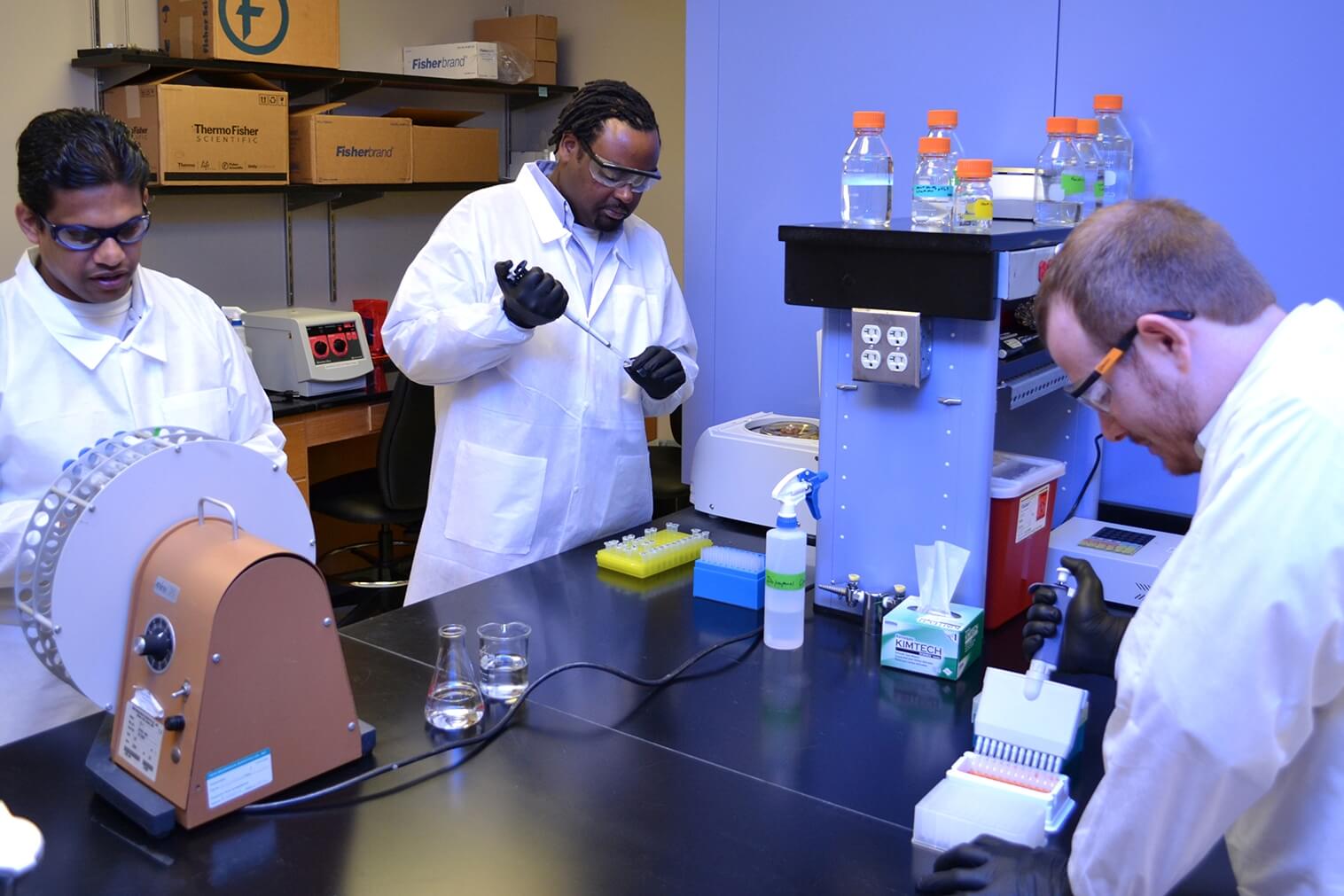
BRI Chief Applauds the Power of NCBiotech Grants
By Susan Poulos, NCBiotech Writer
 |
| BRI scientists at work in the lab include (from left) Sanjeewa Rupasinghe, Ph.D., James Tyus, Ph.D., and blending technician Peter Roettger. -- Courtesy of BRI |
Durham-based BioResource International (BRI) is a fast-growing agricultural biotechnology company in the right place at the right time.
With headquarters in the Research Triangle area of North Carolina, BRI is smack in the middle of the AgBio[Sphere]. And it's finding and providing sustainable solutions to feed the world at a time when the global appetite for meat is greatly expanding, while the price of the feed used in animal production soars.
BRI’s two proprietary enzyme products allow food producers to benefit from increased production, lower feed costs and improved return on investments. The products are:
- Versazyme, introduced in 2005, an enzyme product that breaks down protein and increases the digestibility of soybeans in animal diets. By increasing digestibility of protein, less nitrogen is excreted by animals, which helps lower feed costs and reduces the environmental impact of poultry and swine production.
- Xylamax, introduced in 2014, a high-performance enzyme product that improves energy absorption in both wheat and corn/soy poultry diets. By breaking down the non-starch polysaccharides (NSP) in grain walls it activates the release of valuable nutrients for digestion by the animals’ natural enzymes. It also reduces the viscosity of the intestinal contents by more than 50 percent, which accelerates nutrient digestion. These combined actions optimize energy availability to the animal, resulting in improved growth and gut health.
The technology for the original enzyme product emerged from North Carolina State University when Jason Shih, Ph.D., then a poultry science professor, discovered and cultivated enzymes that were being used to convert poultry manure into methane for energy, and later to degrade keratin, the insoluble protein in feathers. This heat-stable keratinase forms the basis for Versazyme.
In 1999, before retiring from NCSU, Shih founded BRI to expand and commercialize these discoveries with his microbiologist son, Giles Shih, Ph.D., MBA, chairman and CEO of BRI, and Jeng-Jie (JJ) Wang, Ph.D, now senior vice president and chief technology officer. They got funding help from NCBiotech with a $10,000 Business Development Loan.
Grant enables vital data collection
In 2002 BRI received its first Collaborative Funding Grant (CFG) from the North Carolina Biotechnology Center to hire a graduate student to conduct research. With the help of CFG funding, BRI collected the data needed to get additional SBIR Phase 1 funding of $100,000 and Phase 2 funding of $250,000.
Recognizing the rising global demand for meat, in 2008 BRI entered a worldwide agreement with Novus International, the exclusive worldwide distributor for BRI’s patented Versazyme product, and in 2014 partnered with Jubilant Life Sciences to bring Xylamax to South Asia’s poultry market.
In 2013, BRI received its second CFG grant to fund work at NCSU by Sung Woo Kim, Ph.D., professor of nutrition and digestive physiology. The project explores the use of enzymes to break down compounds in plant-based feedstuffs that impair digestion and metabolism in nursery pigs. The additives could reduce feed costs and meat-safety concerns in pig farming.
Because of Kim’s research and reputation in the field, BRI was able to leverage the initial data to get interest from the industry on a global scale. As a result, the company was able to start expanding its market from poultry into swine. And it continues to collect important data from Kim’s research, together with its own. And as Kim continues to recruit the best and brightest graduate students to work in his laboratory, it enriches the talent being recruited to the university, and eventually to work in North Carolina companies such as BRI.
CFGs pack powerful economic impact
“The economic impact of these CFG grants has been tremendous – because it’s geared toward small, resource-limited, spinout companies looking to show proofs of concept and efficacy of products,” says Giles, who has served on the NCBiotech Ag Biotech Advisory Group.
“The nature of the CFG program – the matching component whereby the university contributes money, the company contributes money, and the Kenan Institute (which also adds funding) pulls it all together — is a very good model for companies. The CFG grant was uniquely created for companies like ours, who need additional proof of concept in addition to scientific research. It allows us to do what we know how to do – focus on the research, craft our objectives — and then leverage it into additional funding, research, product creation and sales of product,” he added.
CEO urges other companies to consider grants
“Consider the CFG not just at the early stage of the company (when cash strapped) — but also as the company grows. This grant can enhance areas of research and development, or exploring new areas, without taking focus away from the business,” said Giles.
He encourages business leaders to think about continuing to fund research through grant programs and apply for grants. “They allow research to move forward in a more collaborative way. Sometimes as companies become bigger, they bring all their research in house and lose the opportunity to collaborate with universities. This is why the CFG requires industry/academic collaboration. It benefits everyone.”
That's especially obvious as BRI continues to hire and expand.
